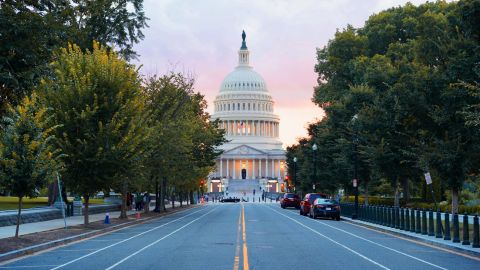ASBMB endorses LGBTQ Data Inclusion Act
The American Society for Biochemistry and Molecular Biology earlier this year endorsed the LGBTQ Data Inclusion Act, a bill that, if passed, would require federal agencies to include questions about sexual orientation and gender identity in surveys that include demographic data self-reported by respondents.
While survey respondents would be allowed to skip the questions, the data collected from those who do volunteer responses would better equip federal agencies to meet the needs of the LGBTQ+ community.
U.S. Rep. Raúl Grijalva, D-Ariz., and Sen. Tammy Baldwin, D-Wis., introduced the legislation in the U.S. House of Representatives and the U.S. Senate, respectively, in June 2021. The ASBMB endorsed the legislation in February.
“This piece of legislation will ensure that LGBTQ+ individuals are included in evidence-based decision-making for allocation of federal funds for resources for their health, safety and well-being,” the society wrote.
This echoed the sentiments of the sponsoring lawmakers.
“The LGBTQ Data Inclusion Act will help ensure that policymakers and community leaders have the information they need to help better understand the full extent of such discrimination and better serve the communities they represent. This bicameral legislation will be a step forward in the march for fairness, freedom and full equality,” Baldwin said in a press release.
If passed, the act will allow for more targeted funding to tackle issues specific to the LGBTQ+ community, such as job security, sexual harassment and inadequate resources in the workplace.
The act aligns with Biden’s DEI efforts
President Joe Biden has been vocal about and has prioritized resolving various inequities.
On his first day in office in January 2021, the president issued an executive order focused on embedding racial equity in the federal government. That order tasked federal agencies with creating equity action plans containing “accountability mechanisms,” “success metrics and key milestones toward progress.”
A separate executive order was aimed at preventing and combating discrimination on the basis of gender identity and sexual orientation.
Many agencies have included in their equity action plans measures to address discrimination against people in the LGBTQ+ community. The Department of Energy, however, has raised the concern that it has not been collecting accurate data on underserved communities, including the LGBTQIA+ community, and therefore does not have a baseline for making sound decisions about programs, awards and activities for them.
Why LGBTQ+ data collection is important
There are more than 11 million LGBTQ+ people in the United States. They comprise about 7.1% of the U.S. adult population.
This population’s needs are varied and unique. Data on gender identity and sexual orientation will give policymakers a better understanding of the challenges they face — such as higher incidences of mental health concerns, HIV, sexual harassment, lower socioeconomic status and less support from family members and important social institutions, such as schools.
TJ Ronningen is a research scientist at The Ohio State University and chair of the LGBTQ+ professional organization Out to Innovate. He explained: “The instruments we use to measure diversity should include all underrepresented and underserved people. Failure to do so goes against scientific principles and increases bias. Failure to do so harms the data and harms the communities involved by not acknowledging their experiences of bias and discrimination."
A key part of the ASBMB’s mission is to support a diverse STEM enterprise. The LGBTQ Data inclusion Act will ensure that science funding agencies both count and consider the society’s LGBTQ+ members.
For instance, had it not included sexual orientation and gender identity in its workplace climate and harassment survey, the National Institutes of Health would not have learned that individuals with gender identities other than man or woman and bisexual individuals are most likely to experience sexual harassment than those with other identities and orientations.
How to collect these data
It is important to collect data not based on a binary system.
The NIH asked the National Academies to review current data-collection methods and publish a consensus report with guiding principles for the agency to follow. That report — titled “Measuring Sex, Gender Identity, and Sexual Orientation” and published earlier this year — contained seven recommendations.
The report’s authors advised the NIH to collect data on gender identity by default and collect data on biological sex only when necessary, “as in the provision of clinical preventive screening or for research investigating specific genetic, anatomical, or physiological processes and their connections to patterns of health and disease.” They provided a pair of questions to asses sex assigned at birth and gender identity.
They wrote: “Asking respondents to separately identify their sex and their gender — in particular, their sex assigned at birth and gender identity — improves overall measurement quality and also allows researchers and other data users to identify individuals with transgender experience by comparing their sex assigned at birth to their current gender identity. This two-step gender measure has become an increasingly common and validated way to identify people with transgender experience because it identifies a wider range of transgender people than single-step methods that ask respondents whether they identify as transgender.”
The authors also provided specific language for the question of sexual orientation: “lesbian or gay,” “straight, that is, not gay or lesbian,” “bisexual,” “don’t know,” “prefer not to answer,” “I use a different term [free text],” and — if the respondents are among the American Indian and Alaska Native populations — “Two-Spirit.”
Another recommendation was about identifying people with intersex traits or differences of sex development. The authors wrote that the NIH “should do so by using a standalone measure that asks respondents to report their intersex status. They should not do so by adding ‘intersex’ as a third response category to a binary measure of sex.”
The remaining recommendations related to funding and studying certain topics.
It is important to ensure that LGBTQ+ individuals are considered when federal agencies are designing and implementing equity activities. The ASBMB urges members of Congress to vote to pass the LGBTQ Data Inclusion Act. It will make certain that members of the LGBT+ community are counted in federal surveys and inform distribution of funds to address issues specific to them.
Enjoy reading ASBMB Today?
Become a member to receive the print edition four times a year and the digital edition monthly.
Learn moreGet the latest from ASBMB Today
Enter your email address, and we’ll send you a weekly email with recent articles, interviews and more.
Latest in Policy
Policy highlights or most popular articles

Building a stronger future for research funding
Hear from Eric Gascho of the Coalition for Health Funding about federal public health investments, the value of collaboration and how scientists can help shape the future of research funding.

Councilors advocate for science on Capitol Hill
ASBMB Councilors meet with their elected officials to advocate for basic scientific research funding and training the next generation of scientists.

Hope for a cure hangs on research
Amid drastic proposed cuts to biomedical research, rare disease families like Hailey Adkisson’s fight for survival and hope. Without funding, science can’t “catch up” to help the patients who need it most.

Supporting science through advocacy and community building
ASBMB calls on scientists to take action as funding cuts and policy shifts threaten the U.S. research enterprise, emphasizing the power of community advocacy and persistence in protecting the future of science.

Seven steps to advocating in your home state
Find out how to schedule, prepare for and conduct a productive district office meeting to communicate the importance of fundamental scientific research funding to your representatives.

ASBMB members call for funding and agency support amidst uncertainty
In 60 meetings on Capitol Hill, scientists urge legislators to reaffirm support for scientific innovation

